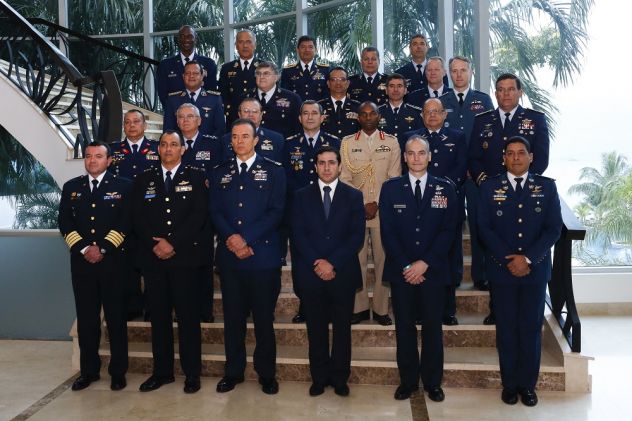Leaders of Latin American air forces convened in the LVIII Conference of Chiefs of the American Air Forces (CONJEFAMER, in Spanish), held June 19-21, 2018, in Panama City. The System of Cooperation Among the American Air Forces (SICOFAA, in Spanish) sponsored the conference. Delegations of member nations of SICOFAA and observers participated.
The goal of the annual meeting is to strengthen the bonds of friendship among partner nations, examine SICOFAA’s mission, approve combined exercises, and share lessons learned. The conference also serves as a platform to update member nations on each force’s operational capacity for optimal response to regional challenges. In addition, the meeting reviews SICOFAA’s operational focus: disaster and humanitarian relief.
“This is a system of cooperation among friends and neighbors,” said U.S. Air Force Lieutenant General Mark D. Kelly, commander of Air Forces Southern. “When our nations are under the stress of natural disasters, floods, fires, hurricanes, earthquakes… you don’t want to meet at a time of crisis, you want to meet beforehand, well before the point of crisis, to learn how each other works, so that when that day comes everything works smoothly.”
Onboarding of Jamaica
The conference has been strengthening bonds of friendship between air forces of the Americas and enabling new forms of cooperation for more than 50 years. In CONJEFAMER 2018, SICOFAA voted to move Jamaica from observer to permanent member.
“I think SICOFAA is a very important system of cooperation for the air forces, which can find ways of collaborating without a lot of political directives,” Major General Rocky Meade, chief of Defense Staff of the Jamaican Defense Force, told Diálogo. “They are just member states helping each other, getting together, analyzing common problems, seeking solutions that can work for all members, rehearsing the solutions, and when there’s a real problem, responding to each other. I think that’s very impressive.”
Jamaica’s inclusion brings SICOFAA closer to the Caribbean, and brings the total number of member nations throughout the Americas to 21. The decision will be mutually beneficial, as Jamaica already takes part in humanitarian relief operations in a region prone to natural disasters.
“I think we can contribute in some way,” Maj. Gen. Meade added. “We can certainly contribute a lot of ideas because we have plenty of experience with hurricanes and other disasters. We can assist with plans and, if we need to help another country, we may not have a very large aircraft, but we can contribute with the few resources we have. I look forward to contributing to the system.”
Effective responses
During the conference, participants analyzed SICOFAA’s responses and shared lessons learned from disasters in 2017. Among the operations carried out, the conference highlighted the combined humanitarian relief operations in Central America following hurricanes Irma and Maria, and the response to the wildfires in Chile.
 Major General Rocky Meade, chief of Defense Staff of the Jamaican Defense Force, looks forward to Jamaica’s contribution as a new member nation of SICOFAA. (Photo: U.S. Air Force Captain Stephanie Schonberger)
Major General Rocky Meade, chief of Defense Staff of the Jamaican Defense Force, looks forward to Jamaica’s contribution as a new member nation of SICOFAA. (Photo: U.S. Air Force Captain Stephanie Schonberger)“SICOFAA’s new operational approach to humanitarian and disaster relief began in 2010,” Peruvian Air Force Colonel Jorge Reátegui Bartra, SICOFAA’s undersecretary general, told Diálogo. “It’s yielding results; we are improving communication systems and providing countries with better tools to better understand each other on humanitarian relief.”
The conference also pointed to the more than 100 tons of medical and search and rescue equipment member nations delivered to Peru after the El Niño Costero floods, as well as the more than 40 tons of supplies sent to Mexico following the September 2017 earthquake. Air forces also assisted with the evacuation of hundreds of people in both countries, among other regional operations.
“SICOFAA is focusing on man-made and natural disaster operations,” said Commissioner Jeremías Urieta, national director of the Panamanian Air and Naval Service Air Group. “The prompt, effective, and efficient responses in situations [such as] Mexico’s earthquake are a case in point.”
For his part, Brigadier General Timo Hernández Duarte, commander of the Guatemalan Air Force, talked to Diálogo about SICOFAA’s response to the Fuego Volcano eruption in early June 2018. “We had a prompt reaction and cooperation through SICOFAA; this strengthened and impressed us.”
Optimizing capabilities
To hone its combined response capabilities, SICOFAA conducts real and virtual multinational exercises known as Cooperation. These exercises allow member nations to develop a common operational language and evaluate results. At the meeting, participants analyzed the cancelled Cooperation V exercise and approved the virtual Cooperation VI exercise, scheduled for April 2019 in Mendoza, Argentina.
“In this period [2017], the real Cooperation V exercise was to be carried out in Puerto Montt, Chile,” Col. Reategui said. “It was cancelled because of the Mexico’s earthquake, and all aircraft, the [SICOFAA] system, and supplies were deployed to Mexico.”
In addition to summing up operations of the previous period, approving the completion of an exercise, participants analyzed several technological systems to optimize operational capability. Among the technological systems highlighted: Objectives and Lessons Learned, a software tool that records observations to be shared as lessons learned; and the Communications Virtual Room System, which enables live transmission of the help a country may require and how each country can assist.
“Through SICOFAA, regional air forces maintain the capacity to combine communications,” said General Jorge Robles Mella, commander of the Chilean Air Force. “Therefore, personnel can prioritize the best ways to help people in need.”
Panama hosted CONJEFAMER for the first time. CONJEFAMER 2019 will be held in San Salvador, El Salvador.
“This event is very important for the [Panamanian] Air and Naval Service and for the country, because we have the opportunity to gather the air force commanders of the Americas,” Commissioner Urieta concluded. “This gives us the opportunity to give back and thank the air forces for what we received all these years”.
Source:
